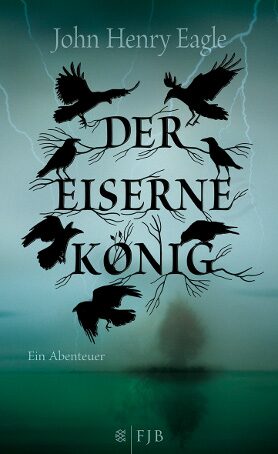John Henry Eagle
Der Eiserne König. Ein Abenteuer
[The iron king. An adventure story]
- S. Fischer Verlag
- Frankfurt am Main 2012
- ISBN 978-3-8414-2117-3
- 656 Pages
- 13 Suitable for age 14 and above
- Publisher’s contact details
John Henry Eagle
Der Eiserne König. Ein Abenteuer
[The iron king. An adventure story]
This book was showcased during the special focus on Russian (2012 - 2014).
Sample translations
Review
You shouldn’t always believe everything that is written on the sleeve of a book. Like a book for young people recommended for those aged fourteen and over. There is not really much that can be said against it, although of course it is possible to read and enjoy Felix Krull at fourteen. But the hitherto completely unknown name of this author and his curious biography also suggest some reasons for suspicion:
John Henry Eagle was born, it is claimed, in 1971 – the son of a British officer stationed in Lüneburg Heath and a German mother. He worked as a stockbroker in London and wrote scripts under a pseudonym before finally publishing this novel under his own name: The Iron King. And then you start reading the book which is described as ‘an adventure story’– at first glance this is a fantasy story with all the right ingredients – and you begin to be amazed and astonished, and the amazement and astonishment don’t stop.
This author’s style – his mad humour and huge talent for dialogue, his masterful knowledge of literature and fairytales, the startling originality of his insights and the natural fluidity of the borders between the possible and the improbable with which he creates a totally unique, unconventional literary universe – has hitherto only been seen in the work of one contemporary German author: Henning Ahrens. And you don’t need to be a literary detective to find out that this is who is actually behind the pseudonym John Henry Eagle, since this information can be obtained without much difficulty from the publisher, S. Fischer Verlag.
Henning Ahrens was born in 1964 and lives on a farm near Hannover. He has already proved with his three earlier novels that there is currently no one else who can combine diverse worlds and associations in such a witty, intelligent and spectacular way.
In his debut novel, Run Hunter Run, a man climbs out of an Intercity train to follow the tracks of a fox and ends up in the parallel universe of a band of robbers lead by Captain John Isegrim Reineke-Schmutz; a combination of a commune which constantly serves up scrambled eggs, a fighting unit and a literary circle, who communicate in a language which could have come straight out of the Grimms’ dictionary – a vocabulary consisting of quotations from fairytales, folksongs and truisms.
In his third novel, Animal Days, a book which tells of a hot summer of longing and pining, Ahrens has a parallel story involving a talking hare and its best friend, a philosophising heron, who together solve a series of crimes.
There is certainly a rationale for Ahrens choosing to write The Iron King under a pseudonym: it gives him the freedom to roam to his heart’s content in a popular – and supposedly less literary – genre, and yet to remain the writer that he is.
It all begins with a band of robbers whose leader is of course not called Grimm by accident. The band, who roam the imaginary land of Flutwidde in ancient pre-history, capture a freckled girl with green eyes on whose back is tattooed a mysterious drawing of a map. When the band try to get their hands on it, a sea of green flames flickers out of the sky and kills all of the rogues except for one: the young Hans, who has fallen in with the robbers by chance after he and his sister Grete were imprisoned in a cage in the forest by a witch. Hans stays out of the way, and survives.
Grimm, the Captain of the robbers, is later brought back to life by a dark force and haunts the novel as an undead – but not unamusing – villain, while Hans sets out with a range of curious companions to save the struggling Flutwidde and to ensure that the legendary Iron King does not come to power for a second time.
Ahrens alias Eagle embodies this adventurous battle between good and evil – fought with every means possible in a form which takes the genre seriously, and yet retains an ironic touch. Hans’ troop of companions consists of a cabinet of Grimm fairytale figures who moreover behave towards one and other as though they had just escaped from a Berlin neighbourhood. Flutwidde turns out to be a land mired in laziness and decadence in which nobody works any longer because there is suddenly an excess of money.
Eagle strings together one idea after another, sending his hero Hans from station to station, Snow White (terrified of apples!), Kunz (whose real name can’t, for obvious reasons, be spoken aloud) & Co., until the 600 sides – which pass in a flash – come to a bloody and apocalyptic conclusion.
On the subject of young people’s literature: there are coarse goings on here and it is far from non-violent. And of course there is another pair of talking animals: fox and badger, who have become inseparable through their profound aversion to one another. The last word belongs to Master Grimbart, the badger: ‘You want to know what I dream about? Battle and adventure, of course'.

John Henry Eagle was born, it is claimed, in 1971 – the son of a British officer stationed in Lüneburg Heath and a German mother. He worked as a stockbroker in London and wrote scripts under a pseudonym before finally publishing this novel under his own name: The Iron King. And then you start reading the book which is described as ‘an adventure story’– at first glance this is a fantasy story with all the right ingredients – and you begin to be amazed and astonished, and the amazement and astonishment don’t stop.
This author’s style – his mad humour and huge talent for dialogue, his masterful knowledge of literature and fairytales, the startling originality of his insights and the natural fluidity of the borders between the possible and the improbable with which he creates a totally unique, unconventional literary universe – has hitherto only been seen in the work of one contemporary German author: Henning Ahrens. And you don’t need to be a literary detective to find out that this is who is actually behind the pseudonym John Henry Eagle, since this information can be obtained without much difficulty from the publisher, S. Fischer Verlag.
Henning Ahrens was born in 1964 and lives on a farm near Hannover. He has already proved with his three earlier novels that there is currently no one else who can combine diverse worlds and associations in such a witty, intelligent and spectacular way.
In his debut novel, Run Hunter Run, a man climbs out of an Intercity train to follow the tracks of a fox and ends up in the parallel universe of a band of robbers lead by Captain John Isegrim Reineke-Schmutz; a combination of a commune which constantly serves up scrambled eggs, a fighting unit and a literary circle, who communicate in a language which could have come straight out of the Grimms’ dictionary – a vocabulary consisting of quotations from fairytales, folksongs and truisms.
In his third novel, Animal Days, a book which tells of a hot summer of longing and pining, Ahrens has a parallel story involving a talking hare and its best friend, a philosophising heron, who together solve a series of crimes.
There is certainly a rationale for Ahrens choosing to write The Iron King under a pseudonym: it gives him the freedom to roam to his heart’s content in a popular – and supposedly less literary – genre, and yet to remain the writer that he is.
It all begins with a band of robbers whose leader is of course not called Grimm by accident. The band, who roam the imaginary land of Flutwidde in ancient pre-history, capture a freckled girl with green eyes on whose back is tattooed a mysterious drawing of a map. When the band try to get their hands on it, a sea of green flames flickers out of the sky and kills all of the rogues except for one: the young Hans, who has fallen in with the robbers by chance after he and his sister Grete were imprisoned in a cage in the forest by a witch. Hans stays out of the way, and survives.
Grimm, the Captain of the robbers, is later brought back to life by a dark force and haunts the novel as an undead – but not unamusing – villain, while Hans sets out with a range of curious companions to save the struggling Flutwidde and to ensure that the legendary Iron King does not come to power for a second time.
Ahrens alias Eagle embodies this adventurous battle between good and evil – fought with every means possible in a form which takes the genre seriously, and yet retains an ironic touch. Hans’ troop of companions consists of a cabinet of Grimm fairytale figures who moreover behave towards one and other as though they had just escaped from a Berlin neighbourhood. Flutwidde turns out to be a land mired in laziness and decadence in which nobody works any longer because there is suddenly an excess of money.
Eagle strings together one idea after another, sending his hero Hans from station to station, Snow White (terrified of apples!), Kunz (whose real name can’t, for obvious reasons, be spoken aloud) & Co., until the 600 sides – which pass in a flash – come to a bloody and apocalyptic conclusion.
On the subject of young people’s literature: there are coarse goings on here and it is far from non-violent. And of course there is another pair of talking animals: fox and badger, who have become inseparable through their profound aversion to one another. The last word belongs to Master Grimbart, the badger: ‘You want to know what I dream about? Battle and adventure, of course'.
Translated by Sheridan Marshal

By Christoph Schröder
Christoph Schröder, born 1973, lives and works as a freelance author and reviewer in Frankfurt am Main. Among others, he writes for ZEIT, Deutschlandfunk and SWR Culture.
